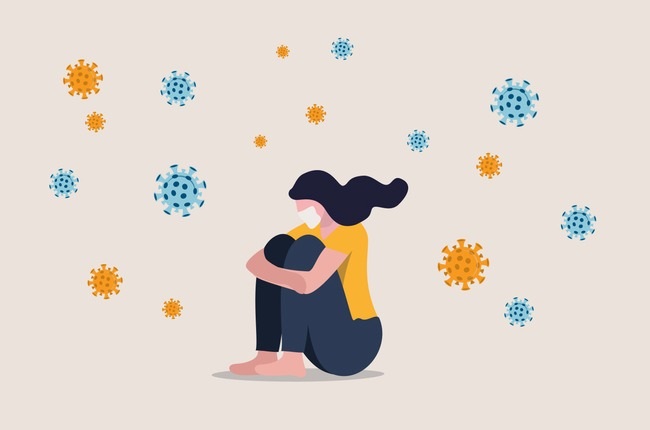
- Millions of people who were previously fit and healthy before their Covid infection are now struggling with basic day-to-day tasks.
- Long Covid is affecting the lives and livelihoods of millions of people globally, reports the World Health Organization.
- One SA researcher who's been at the forefront of long Covid research weighs in.
Many of us have slowly returned to normal life, but millions of others who’ve had Covid-19 are still battling with lingering symptoms months after their acute infection has passed.
By now, you’ve probably heard of ‘long Covid’ – a condition where people no longer have the live SARS-CoV-2 virus (which causes Covid-19 disease) in their bodies. They would test negative for the virus but still experience debilitating symptoms.
Covid has claimed more than 6.5 million lives and infected more than 620 million people globally. It is estimated that 10% to 30% of survivors have new, returning, or ongoing health problems four or more weeks after a bout with Covid, says the US Centers for Disease Control and Prevention (CDC). About 15% of those with the condition experience symptoms for at least 12 months.
Common symptoms include severe fatigue, struggling to breathe, coping with brain fog and memory loss, while others experience smell and taste loss, which can be more dangerous than we realise.
READ MORE | Long Covid: How 3 SA insurance companies are handling sickness, disability claims and life cover
In April, then-pregnant Lauren (29) told News24 that her Covid-related smell loss was a daily threat to her and her unborn baby. “We had a fire in our complex. I didn’t smell a thing. I looked outside and just thought, ‘Oh, it’s getting a bit dark’. Our windows were all open,” she said.
Riana (45) went from an induced coma to learning how to walk again. “I lost my job throughout this whole process … I also have to take oxygen many times a day, so I cannot move around freely,” she said.
Other long haulers have told News24 that the psychological effects of long Covid had been more trying; that they’d gone from doing karate and kickboxing three times a week to barely being able to do a five-minute walk; and that eight months after being on a ventilator due to Covid, they were still ill and had to quit their job.
Kerry-Lee (32), who felt like she was young and “still had a lot to give,” said she “survived the illness, but the life I knew was snatched away from me”.
Studies suggest that children get long Covid, too. The risk appears to be low in the paediatric population, although most of the published research on long Covid to date primarily focuses on adult populations, according to a review published in Scientific Reports this year.
READ MORE | Living with long Covid: Smell loss, hypertension, eye sensitivity – ‘This is not a friendly virus’
Long Covid was first talked about in 2020, although, at that point, it didn’t have a name, and people simply described their journeys of not recovering. Moreover, investment in treatments and vaccines developed during this time were largely centred on protecting people against the most severe effects of Covid disease.
Now, more than two years into the pandemic, the focus is finally shifting to the long-neglected mystery of post-viral syndromes. This month, the World Health Organization (WHO) director general called for “sustained action" to help people still experiencing "prolonged suffering".
Dr Tedros Adhanom Ghebreyesus wrote that long Covid was “devastating people’s lives and livelihoods” and wreaking havoc on health systems and economies. The “very serious” crisis required countries to launch “immediate” efforts to tackle it, he said.
Adhanom Ghebreyesus acknowledged there was a lack of evidence on how best to treat long Covid and that this was having devastating effects on sufferers’ lives.
“While the pandemic has changed dramatically due to the introduction of many life-saving tools, and there is light at the end of the tunnel, the impact of long Covid for all countries is very serious and needs immediate and sustained action equivalent to its scale,” he said.
READ MORE | Long Covid concentration and memory issues common, could impact working population - study
The WHO head has set out a five-point plan for helping long haulers. This includes:
- granting highly affected patients immediate access to antivirals;
- investing money and time in research for tools and solutions;
- treating and detecting patients more effectively;
- taking care of the physical and mental health of patients, and
- giving financial support to those who are not able to work.
"On behalf of the scientific community, health workers and the patients with long Covid WHO has worked with, I urge all leaders to seriously ramp up support so that we can minimise the suffering and improve the health of those affected so they can return to living their fullest lives," wrote Adhanom Ghebreyesus.
What causes long Covid?
Researchers have a few leading theories behind the cause of long Covid. One theory is a phenomenon called 'viral persistence', wherein the SARS-CoV-2 virus remains inside the gut lining of patients long after they recover from the acute phase of Covid infection.
Another theory is that of persistent microclots, which has been suggested by professor Resia Pretorius, a physiologist at Stellenbosch University. Pretorius has banded together with her colleagues to be at the forefront of long Covid research.
Pretorius and her colleagues enrolled long haulers in 2021 and reported in Cardiovascular Diabetology that such microclots could linger in the blood of long Covid patients.
In their study, they found signs of excessive blood clotting in 11 people with long Covid, but not in healthy people or another group with type 2 diabetes, whom they used for comparison, Science magazine explained. Detecting these microclots in blood is a laborious process for clinicians, but Pretorius is working to make it more accessible to doctors.
READ MORE | Distortion and loss of smell after Covid: Smell training can help, expert says
Commenting on the WHO's recognition of long Covid, Pretorius told News24:
Pretorius added that she hopes that researchers and clinicians will start taking long Covid research seriously, including those linked to micro clots and viral persistence, as well as autoantibodies and widespread damage to various organs, and that research that has already been published be acknowledged.
"And hopefully we will get to an answer very soon. We need trials, and we need people to test our research findings in a broader sense. We need diagnosis, and we desperately need treatment for these patients," says Pretorius.




 Publications
Publications
 Partners
Partners











